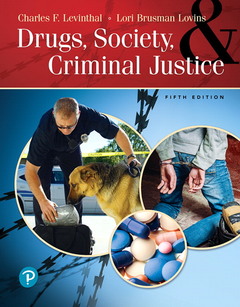Drugs, Society and Criminal Justice (5th Ed.)
Auteurs : Levinthal Charles, Brusman-Lovins Lori

For courses in drugs and alcohol in criminal justice.
The social impact of drug abuse, through a criminal justice lens
Drugs, Society, and Criminal Justice is a comprehensive, easy-to-read introduction to drug-taking behavior and its impact on the criminal justice system. Building on sociological theory, the authors explore the social problems associated with drug abuse, a range of drug-control policies and their enactment, and the complex relationship between drug-¿taking behavior and crime. The 5th edition has been extensively updated, with a brand-new Part II focused on criminal justice topics related to drug abuse and drug law. This edition also includes chapter-level reorganizations throughout the text and updated features prompting discussion, assignments, and deeper comprehension.
PART I: THE CHALLENGE OF DRUGS IN OUR SOCIETY
1. Understanding the Drug Problem in America
2. Understanding the Drug Problem in Global Perspective
3. Drug-Control Policy in America
PART II: DRUGS, CRIME, AND CRIMINAL JUSTICE
4. Drugs and Crime
5. Drug-Law Penalties
6. Drug and Law Enforcement
7. Drugs and Correctional Interventions
PART III: DRUG-TAKING BEHAVIOR IN OUR SOCIETY
8. Drug-Taking Behavior: Fundamentals and Theoretical Perspectives
9. Opioids
10. Cocaine and Methamphetamine
11. Marijuana
12. Hallucinogens and Depressants
13. Alcohol Misuse and Alcohol-Related Crime
PART IV: PREVENTION, PROTECTION, AND DETERRENCE
14. Prevention and Strategies for Change
15. Advancing Public Health: The Regulation of Tobacco
16. Deterrence through Drug Testing
About our authors
Charles F. Levinthal is a distinguished professor emeritus at Hofstra University. During his over 40-year tenure on the Hofstra faculty, he chaired the Department of Psychology for nine years as well as assuming other leadership roles in the department and university. While teaching dozens of courses in neuropsychology and cognitive psychology for both undergraduate and professional graduate students, he conducted research in the fields of cognitive neuropsychology and decision-making. His academic honors include the Hofstra University Distinguished Faculty Lecture Award in 1987 for his research on the history of opium and the Distinguished Teacher of the Year Award as voted by the graduating Hofstra Class of 2003. He was elected as a fellow of the American Psychological Association in 2010.
Levinthal has authored 19 books: Messengers of Paradise: Opiates and the Brain (1988) with Spanish and Japanese translations in 1989 and 1991, respectively; three editions of Introduction to Physiological Psychology (1979, 1983, 1990); Point-Counterpoint: Opposing Perspectives on Issues of Drug Policy (2003); nine editions of Drugs, Behavior, and Modern Society (1996, 1999, 2002, 2005, 2008, 2010, 2012, 2014, 2019) with a Korean translation in 2008; and five editions of Drugs, Society, and Criminal Justice (2006, 2008, 2012, 2016, 2019). Levinthal served on the Core Curriculum Planning Committee during the formation of the Zucker School of Medicine at Hofstra University and lectures extensively on topics ranging from the history of drugs to message-framing factors in decision-making. His writing reflects the philosophy that a textbook is ultimately successful when it is both engaging and educational. One of the best compliments Levinthal received was a review by a student who remarked that his textbook was the first one he had actually enjoyed reading.
Hallmark features of this title
Interconnections between drugs, drug abuse and criminal justice
- Social problems and the sociological theory behind drug-taking behaviors are examined.
- The full range of legal and illicit drugs is presented. Drugs are grouped based on their access to the public and social attitudes toward their use, rather than by pharmacological or chemical characteristics.
Updated pedagogical aids
- What Would You Do? is a critical-thinking feature at the end of each chapter challenging students to apply chapter material to real situations.
- Quick Concept Checks, embedded within chapters, provide opportunities to self-test basic concepts from the text.
- Help Line feature provides tips for recognizing signs of drug abuse and for responding to drug-related emergency situations.
Date de parution : 06-2019
Ouvrage de 416 p.
21.7x27.6 cm



